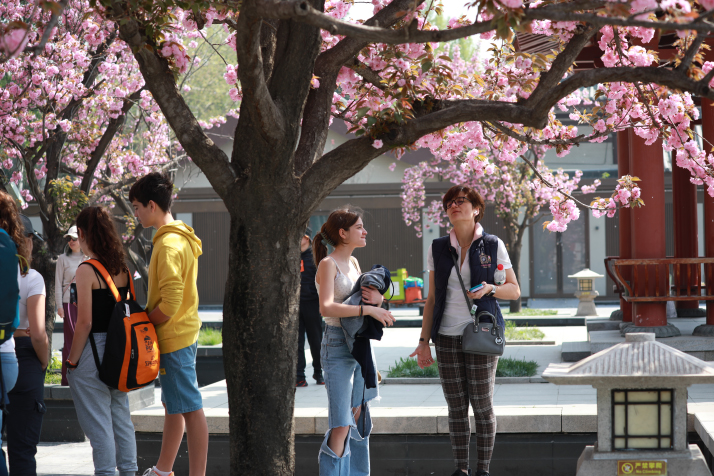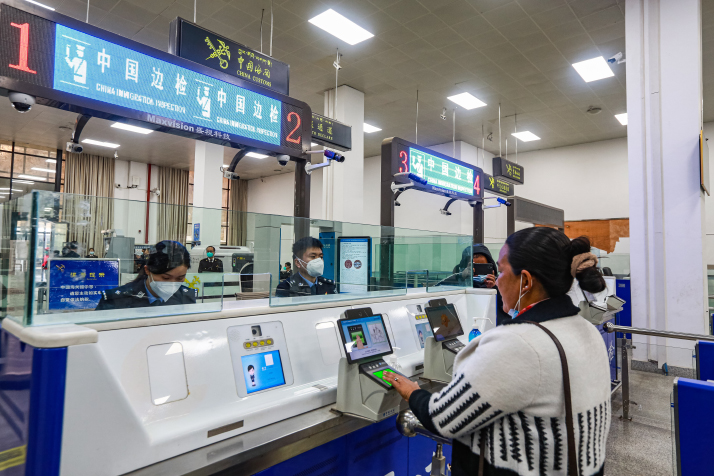
"I really like Yunnan and have been thinking about how to help more Vietnamese people learn about its beauty and culture. After this tour, I will go back to tell travel agencies in Viet Nam how to apply for visas and develop routes," Dao told Lijiang.cn, a local news portal. He added it is expected the number of Vietnamese tour groups visiting Lijiang will increase around International Workers' Day on May 1,as it will be marked by a five-day holiday in China this year and by a long weekend in Viet Nam.
Demand for inbound travel to China has begun to recover. Local agencies and online tourism service providers were once again permitted to operate inbound group tours and provide services such as booking hotels and plane tickets for international tourists starting on March 31, according to a circular released by the Ministry of Culture and Tourism (MCT) that day. Earlier last month, the Ministry of Foreign Affairs of China announced that China would resume issuing all types of visas starting on March 15.
China's travel market was hit hard by the COVID-19 pandemic, with many travel agencies and service providers closing over the past three years. The recovery of inbound group tourism is an attempt to invigorate the economy and promote exchanges. "This has brought a very strong signal to the market and also demonstrated to the international community that China is ready to open its doors and welcome tourists from the rest of the world," Lu Ning, head of the School of Tourism Sciences at Beijing International Studies University, told China Youth Daily.

A small boom
Half an hour after the circular on the resumption of inbound tours was released, inbound ticket searches on the official site of Trip.com
Group, China's leading online travel agency formerly known as Ctrip, soared by more than 200 percent over the previous month.
Even before China began granting tourist visas, the easing of COVID-related border restrictions had already created a surge in demand for inbound travel. According to Trip.com's data, from January to March, booking volume of inbound travel increased by 46 percent year on year, and hotel booking volume of inbound passengers rose by 27 percent over the previous year.
Alibaba Group's online travel platform Fliggy also showed a similar upward trend in terms of booking for inbound travel, with Thailand, Japan, the Republic of Korea, Singapore and Australia, among others, being popular source countries of travelers to China. Meanwhile, the average price of air tickets sold through the platform decreased by 12 percent year on year.
On February 6, travel agencies and online tourism service providers in China were granted permission to resume the organization of outbound group tours to 20 countries, including Thailand, the United Arab Emirates, South Africa, Russia and Cuba. On March 10,
the MCT released the second batch of 40 destination countries for outbound Chinese travelers.
Sun Jie, CEO of Trip.com, believes the recovery of China's inbound and outbound tourism will enhance its ability to attract customers, as well as drive the recovery of the world economy and the integration of Chinese culture into world culture.

What China offers
"After three years of waiting, our business has finally begun to recover, giving us great confidence," Cui Zhan, who is in charge of the inbound travel department of Henan Zhongxin International Travel Agency, told Dahe.cn, a news portal based in Henan Province. Cui said despite three years of suspended business, the agency's communication with overseas counterparts has not stopped, nor has its development of routes and tourism products.
The agency has focused on developing routes in cities with natural landscapes or historical sites, such as Luoyang in Henan which is famous for its peonies. The city has a 1,500-year history of cultivating the flower and claims to have the best peonies in the country.
The international branch of CYTS Tours Holding Co. Ltd., one of China's leading travel agencies that receives the most inbound tourists, has explored an increasing number of multilingual services and products. "We have developed online tools for international travelers to solve their challenges in language and mobile Internet access so that they can enjoy China's convenient online and digital services," Hu Jiying, Vice General Manager of the branch, told Beijing Review.
Local governments have also started to make moves. On March 26, Shandong Province, the ancestral home of great thinkers Confucius and Mencius, held a conference at which about 100 local and global travel agencies launched initiatives to boost the province's inbound tourism.
Located in east China and facing the Korean Peninsula and the Japanese archipelago across the sea, Shandong caters to the diverse needs of global travelers in terms of culture and customs, hiking and golden beaches. "Shandong tourism is a microcosm of China's inbound tourism. It has both picturesque natural scenery and splendid cultural heritage," Vice President of Trip.com Zhang Xu told the conference.
In March, Chengdu in Sichuan Province, which is also known as the Home of the Giant Pandas, also welcomed its first international delegation in this year, which came from Southeast Asian countries.
In addition to inviting guests to visit, provinces have also been promoting their distinctive tourist attractions abroad. For example, the Municipal Bureau of Culture, Radio, Television and Tourism of Suzhou, Jiangsu Province, presented its traditional dances and guzheng, or Chinese zither, to attract potential tourists, during an autumn fashion show staged at a shopping center in Minnesota, the U.S., in 2022. The exquisite gardens and architecture of Suzhou, also known as the Venice of the East, were highly praised by travel information platform Lonely Planet. The bureau, with over 1 million followers on social media platforms including Facebook, Instagram, Twitter and YouTube, also promoted Suzhou's tourism resources on these platforms.
International flight capacity is also gradually recovering. According to the Center for Asia Pacific Aviation, China's international flight capacity in the week beginning on March 20 had reached 25.9 percent of the 2019 levels, compared with 9.7 percent late last December. Future increases in capacity are also expected to bring about a decrease in ticket prices for both inbound and outbound flights.
Bao Jigang, a professor at the School of Tourism Management at Sun Yat-Sen University in Guangdong Province, believes the importance of inbound travel is not only reflected in economic benefits such as foreign exchange earnings, but also in enabling visitors to understand China.
"Mainstream Western media maintain a bias when reporting on China. For example, when covering Xinjiang, Tibet or some social events, their reporting is often quite different from the actual situation. If there is no people-to-people interaction, it is difficult to change the negative perceptions created by this propaganda and to break international audiences' stereotyped thinking on China," Bao said.
Renowned for its karst landscape, Yangshuo in Guangxi Zhuang Autonomous Region has received many backpackers from all over the world. Some global travelers stay for days or months, while some open shops and settle there. They introduce the details of life in China from multiple perspectives through social media, playing an important role in helping the rest of the world better understand China.

Recovery takes time
"Tourism needs an economic foundation. It may still take some time to recover to the 2019 level," Cui said.
Xu Xiaolei, Chief Brand Officer for CYTS, also believes full recovery could be a longer-term goal, as the resumption of inbound group tourism still requires visa processing, the research, development and launch of products, and the building of service teams. In addition, foreign travel agents will also need time to adjust their products.
"Domestic travel agencies are mostly local service providers accepting orders from foreign counterparts. However, agencies from main tourist source regions like Europe, America, Japan, the Republic of Korea, Australia and New Zealand may require one year to better prepare their China-related products and services," Xu said.
Hu of CYTS projected that while the second half of this year will see some progress, the large-scale recovery of inbound tourism is expected to be seen next year.
The simplification of visa procedures, flight and train ticket discounts for inbound tourists, as well as convenient access to online and digital payment services will all help enhance the attractiveness of China as a tourist destination, Hu said.
Moreover, the past three years under the pandemic have led to a large number of foreign language tour guides switching careers. "At present, there is an urgent need for inbound tourism professionals, including inbound tour coordinators, salespeople and multilingual tour guides," Hu added.
(Print Edition Title: A Welcoming Destination)
Copyedited by G.P. Wilson
Comments to luyan@cicgamericas.com